高中英语人教版必修三Unit4 Astronomy:the science of the stars Warming up and Reading课件(65张)
文档属性
| 名称 | 高中英语人教版必修三Unit4 Astronomy:the science of the stars Warming up and Reading课件(65张) |
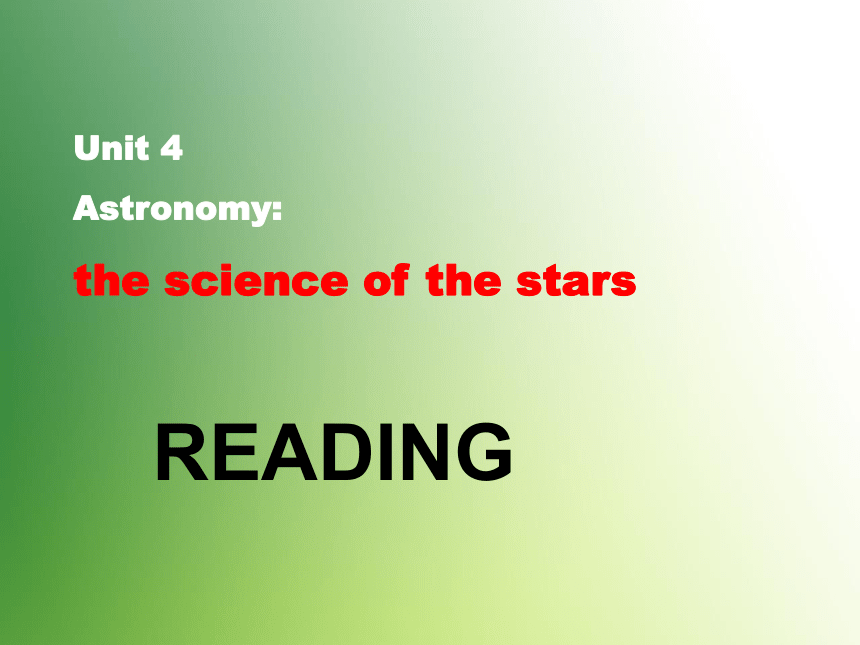
|
|
| 格式 | zip | ||
| 文件大小 | 14.8MB | ||
| 资源类型 | 教案 | ||
| 版本资源 | 人教版(新课程标准) | ||
| 科目 | 英语 | ||
| 更新时间 | 2020-05-04 17:44:48 | ||
图片预览

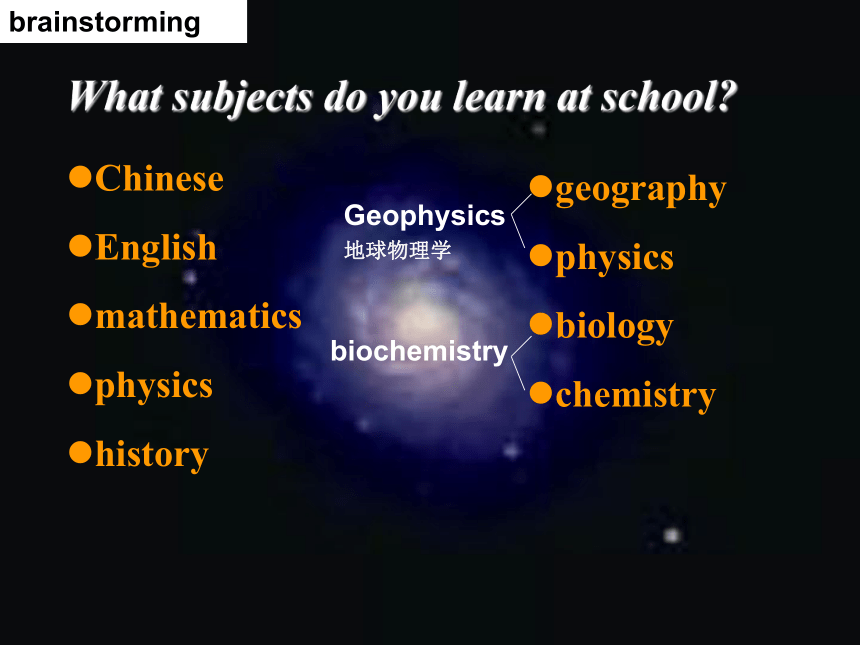
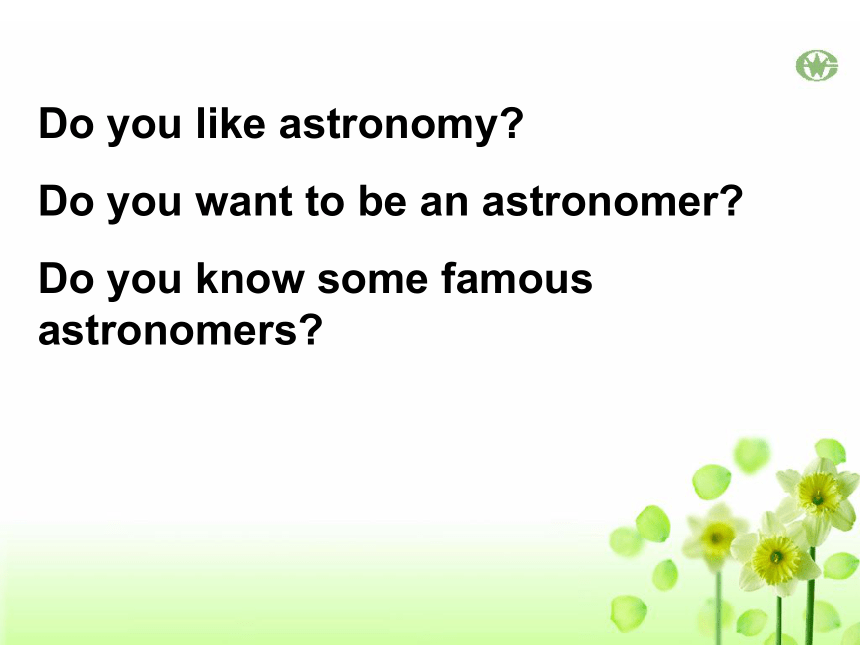
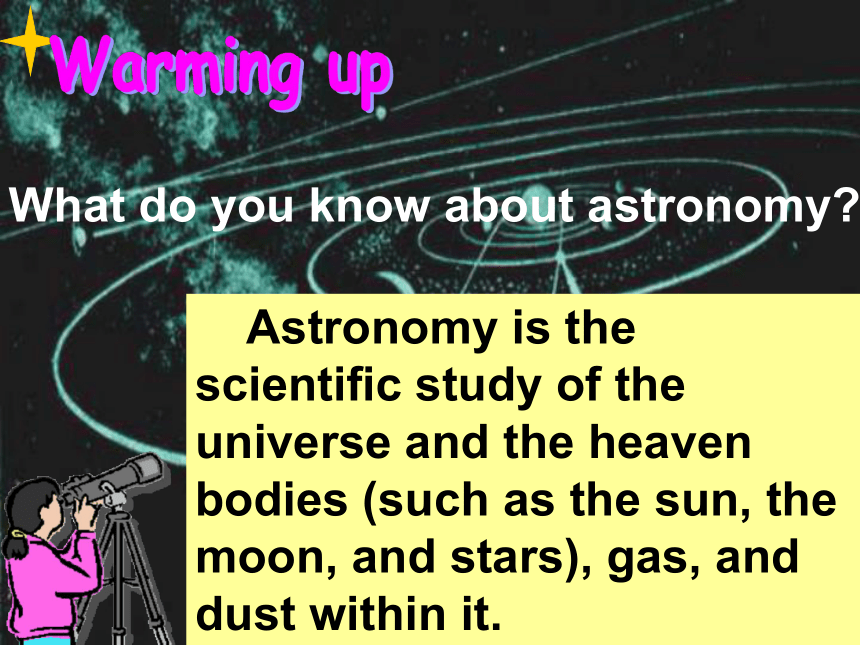
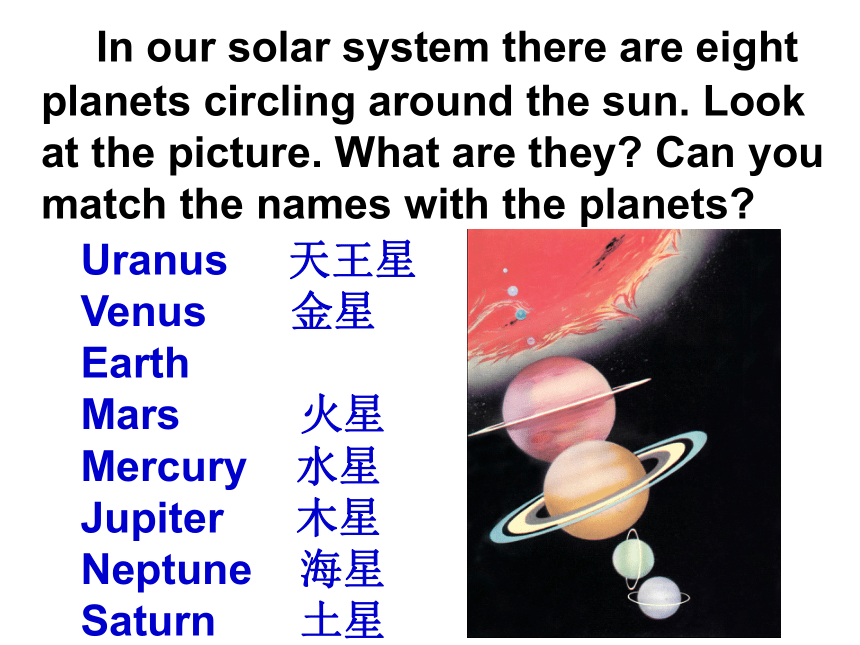
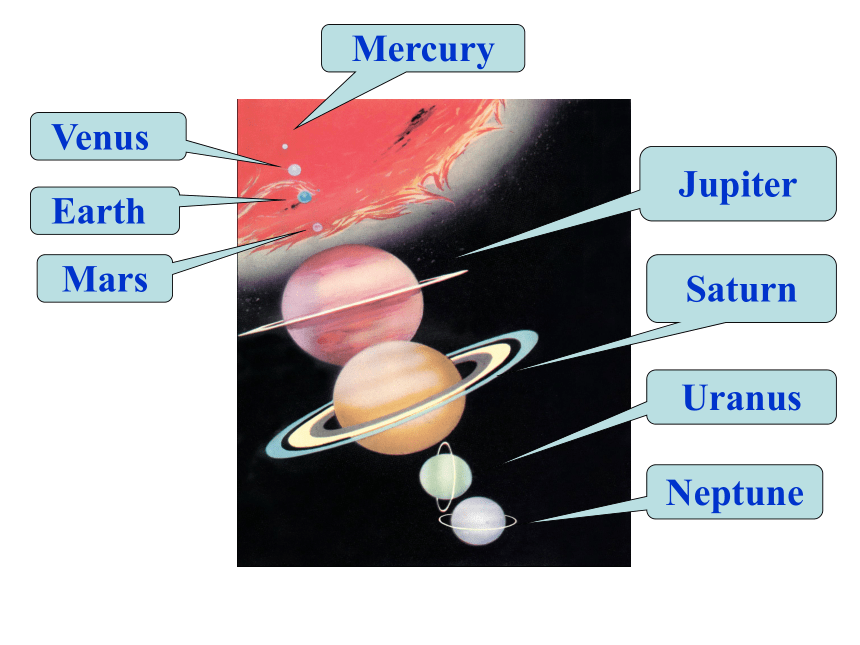
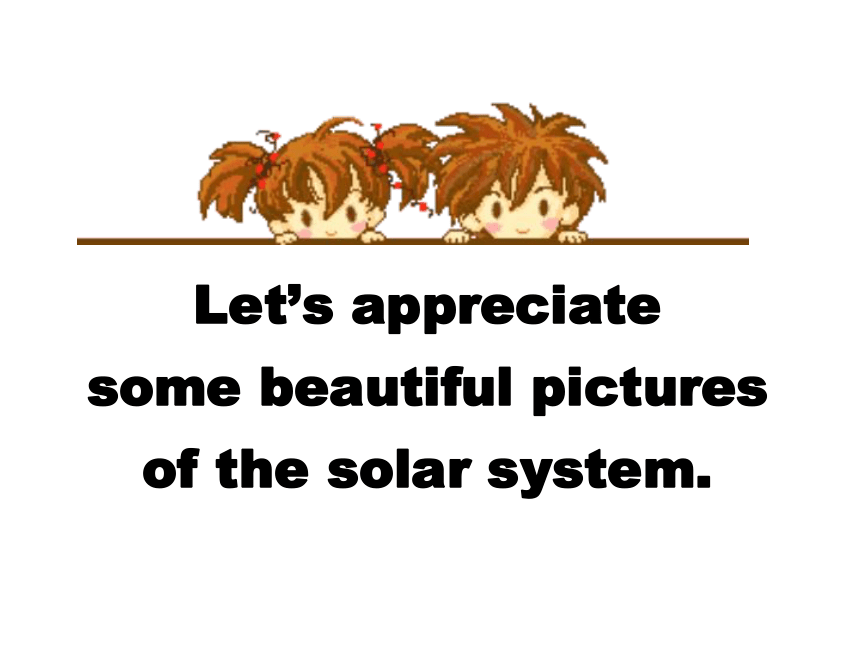
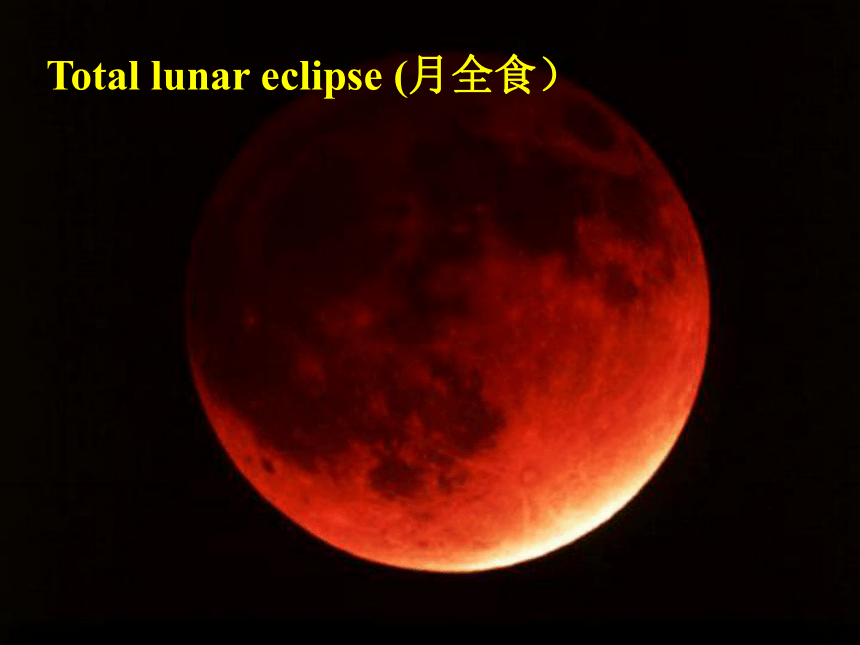
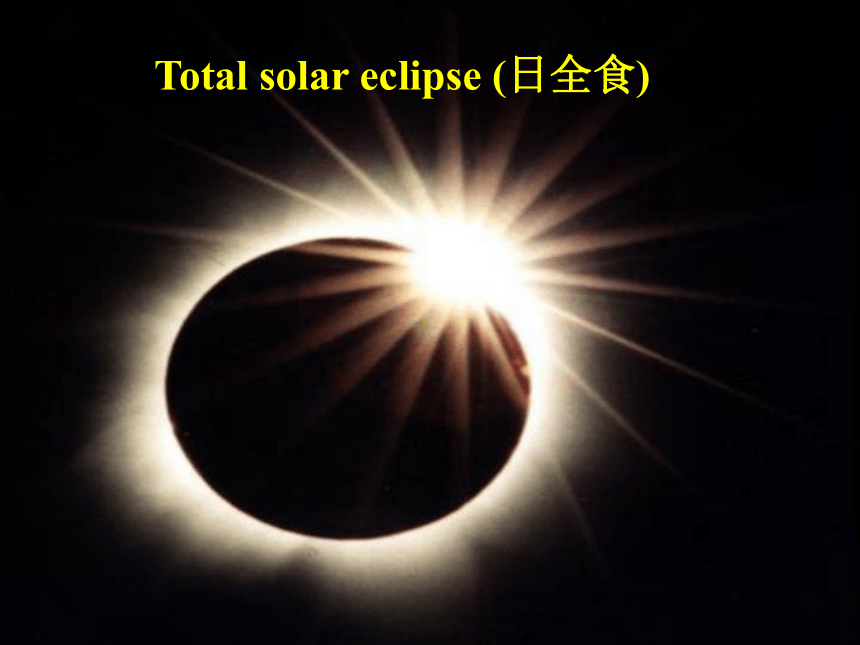
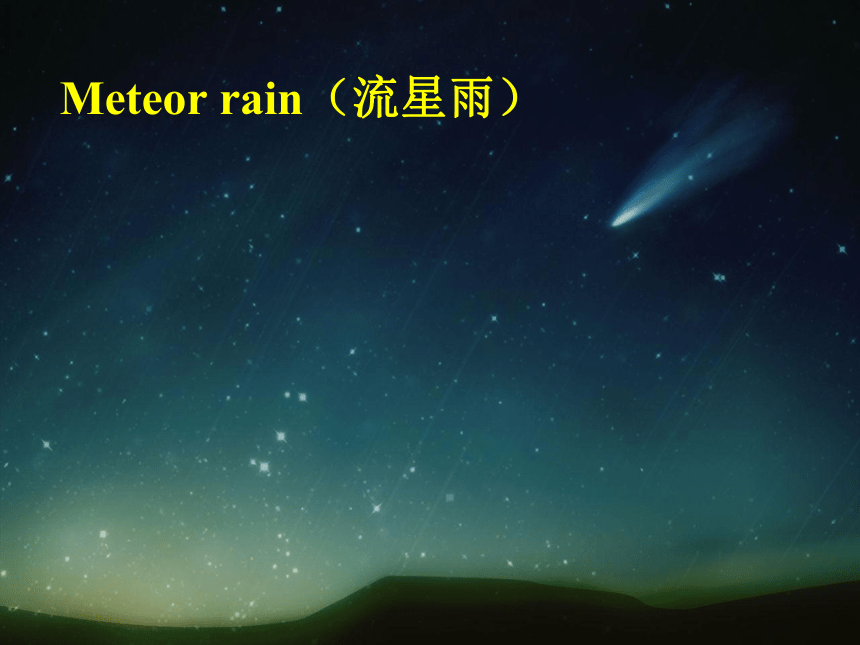
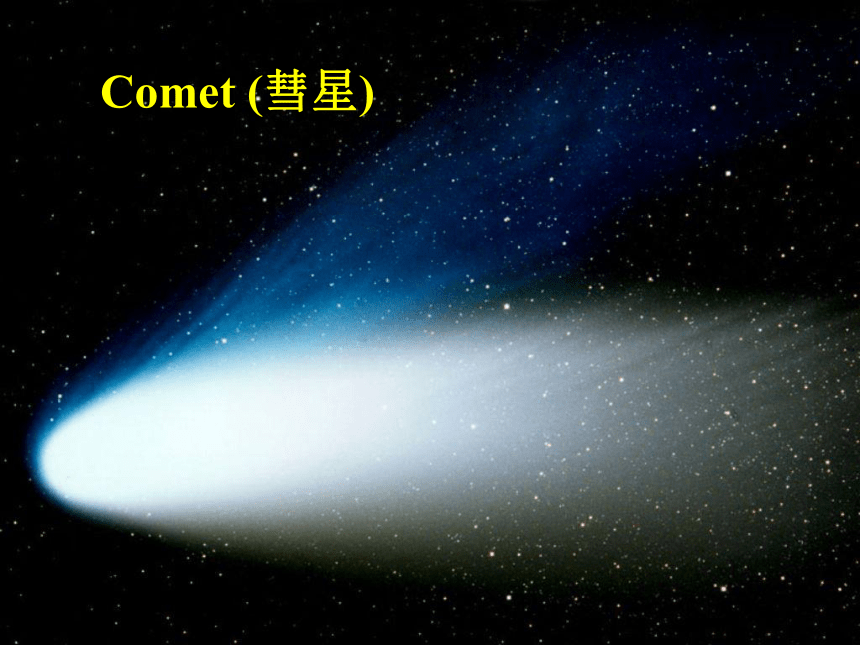
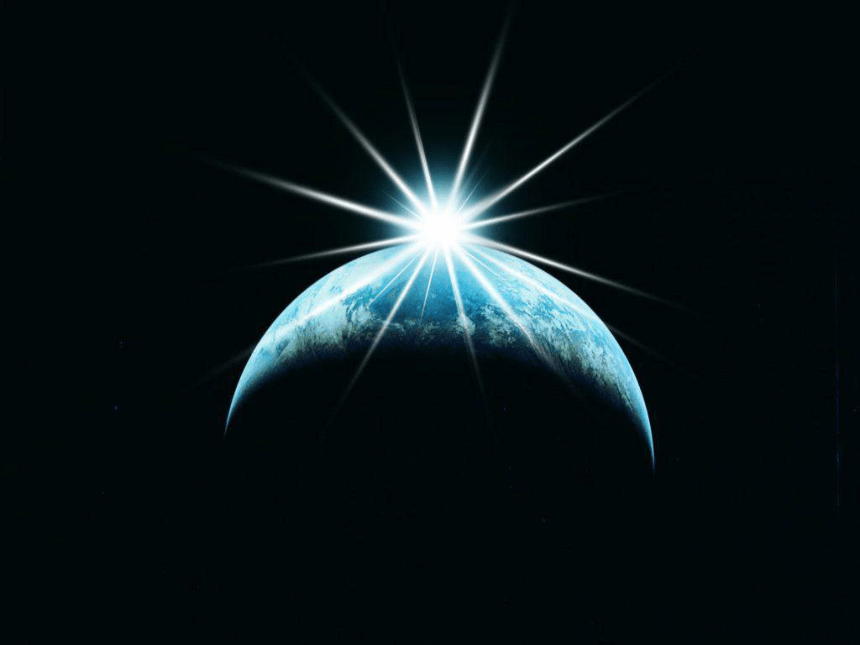
文档简介
课件65张PPT。Unit 4
Astronomy:
the science of the stars READINGWhat subjects do you learn at school?Chinese
English
mathematics
physics
history
geography
physics
biology
chemistrybrainstormingGeophysics
地球物理学biochemistryDo you like astronomy?
Do you want to be an astronomer?
Do you know some famous astronomers?What do you know about astronomy? Astronomy is the scientific study of the universe and the heaven bodies (such as the sun, the moon, and stars), gas, and dust within it.Warming up In our solar system there are eight planets circling around the sun. Look at the picture. What are they? Can you match the names with the planets?
Uranus 天王星
Venus 金星
Earth
Mars 火星
Mercury 水星
Jupiter 木星
Neptune 海星
Saturn 土星Mercury Venus EarthMarsJupiterSaturnUranusNeptuneLet’s appreciate some beautiful pictures of the solar system.Total lunar eclipse (月全食)Total solar eclipse (日全食)Meteor rain(流星雨)Comet (彗星)What interests you in astronomy?
Do you know any questions that astronomers are interested in?How did life begin on Earth? How was the universe formed? Pre-readingIs there life on the planets? Each religion and culture has its own ideas about how life began on earth. What do you know ?
Are they true for the beginning of the life?Pangu separated
the sky
盘古开天Nvwa created humans
女娲造人God created
the world
上帝创世论Pangu separates the sky from the earth. Legend: The Goddess Nuwa mended the heaven and created human beings from the clay(粘土).According to Bible (圣经), God
created the world and the first man,
Adam (亚当) and the first woman,
Eve (夏娃). God created the world in seven days.Religious Beliefs Day 1: God spoke and separated light from darkness, creating Day and Night.Day 2: God spoke and separated the water creating sky and ocean.Day 3: God spoke and created dry land.Day 4: God spoke and created the sun, the moon and stars.Day 5: God spoke and created living things in the air and sea.Day 6: God spoke and created the land animals and the first man.Day 7: God rested and called this day Holy.A Quiz Game 1. How old is the earth?
A. About 3.5 billion years
B. About 4.5 billion years
C. About 5.5 billion years
D. About 6.5 billion years
2. ______ of the earth surface is covered
by water.
A. 20% B. 30% C. 50% D. 70%3. How many planets are there in the Solar System?
A. 6 B. 7 C. 8 D. 9
4. What is the total population of humans on the earth?
A. About 3.5 billion B. About 4.5 billion
C. About 5.5 billion D. About 6.5 billion5. How long does the rotation (自转) of the earth take?
A. 12 hours B. 24 hours
C. a month D. 365 days
6. Which continent is the smallest?
A. Africa B. North America
C. South America D. Oceania
7. On what day is the Earth day celebrated?
A. April 22 B. May 4
C. August 21 D. November 118. Which ocean is the largest?
A. The Pacific Ocean
B. The Arctic Ocean
C. The Indian Ocean
D. The Atlantic Ocean
9. Which country has the largest area?
A. Canada B. China
C. Russia D. U.S.AHow Life Began on the EarthHowLIFE BEGAN ON THE EARTH?Reading Read the title and look at the pictures.
Predict what the reading will be about?Scientific Theories Famous scientists such as Newton,
Einstein and Stephen Hawking had their own theory about the origin of
the universe.The universe began from the Big Bang. Life first began in the sea on the earth. Life was brought to the earth by ET from outer space. Life came from a comet which hit the earth. Fast reading
1.Match the main idea of each paragraph
Para. 1 The formation(形成) of the
earth.
Para. 2 The importance of water for
life.
Para. 3 A widely accepted theory
about the formation of the
universe.
Para. 4 The arrival of humans and
their impact on the earth.
Para. 5 The development of plants
and animals on the earth.2. The main idea of the text.
The text mainly tells us the __________ of the earth and the _____________of life on it.
formationdevelopment Read the passage again and put the order of development of life into a timeline according to the reading passage. (Exercise 2 on Page 27)1. Insects and amphibians appeared.
3. The earth became a solid ball.
5. Reptiles appeared.
7. The earth was a cloud of dust
9. Shellfish and other fish appeared.
11. Clever animals with hands and feet appeared2. Dinosaurs appeared.
4.Small plants grew on the water.
6. Plants began to grow on dry land.
8. Water appeared on the earth
10. The universe began with a “Big Band”.
12. Mammals appeared.831091151741262Can you put the order of development of life into a time line?Ex.2 on P27
While-reading Read the passage as listening to the tape, and then answer the following questions. Questions:
How did the universe begin according to a
widely accepted theory?
2. What was produced when the earth
exploded?
3. Why is water important on the earth?
4. Why did green plants help life to develop?
5. Why were mammals different from other
life forms?
6. What’s the problem with the earth now?1. How did the universe begin according to a widely accepted theory?
(Para.1)The universe began with a Big Bang.
2. What was produced when the earth exploded?
(Para.2)Carbon, nitrogen, water vapour and other gases.
3. Why is water important on the earth?
(Para.3)It allowed the earth to dissolve harmful gases and acids into the oceans and seas.4. Why did green plants help life to develop?
(Para.4)Because green plants can take carbon dioxide from the atmosphere and fill the air with oxygen.
5. Why were mammals different from other life forms?
(Para.4)Because they gave birth to young baby animals and produced milk to feed them.
6. What’s the problem with the earth now?
(Para.5)The earth may become too hot to live on. Detailed reading
This text can mainly divided into two parts
part 1 : The development of the earth
part 2 : The development of life
(para 1—3)(para 4—5)part 1: The development of the earth(1) After the Big Bang, what was the earth like? a cloud of dust a solid globe exploded with fire and rock produced water
vapour and gases(2) What happened next?(3) What did the water vapour and gases
form?the earth’s atmosphere Water appeared(4) What appeared as the earth cooled down?water is important for the beginning of life on the earth. Why is water so important for the beginning of life?
Because water allowed the earth to dissolve harmful gases into oceans and seas.?part2 The development of life small plants appears in water 1.What life developed after water appeared?Shellfish and all sorts of fish 2.What life developed in water next? green plants began to grow on land insects appeared3.What about the life on land? reptiles appeared dinosaur developed 5.What life developed after forests
appeared?mammals on land6.What life developed after dinosaurs? small clever animals7. What life developed after mammals?summaryAfter the “big bang”, the earth was still just a cloud of _______,it _______loudly with fire and rock, which were _____ to produce the_________, water vapour and other gases. Then ________ began to appeared on the earth. dustexplodedin timecarbonwater ____________ in water are considered to be the earliest lives on the earth. The O2 they supplied encouraged the lives of____ __________. Slowly green plants grew on land, which were followed by __________ like insects & ________. When the plants grew into______, ______ appeared. Then _______ developed but disappeared later, which made the rise of a totally different animal,______, possible, and finally _____ spread all over the world.shell--fish and fishamphibiansforestsreptilesdinosaursmammalhumansThe small plantsland animalsClever animals with hands and feet
(Human beings) Para.5 We have only one earth!We should take care of the earth!ks5u精品课件Post-reading Only if we understand can we care;
only if we care will we help;
only if we help shall all be saved.
——Jane Goodall
唯有了解,我们才会关心 ;
唯有关心,我们才会行动;
唯有行动,生命才会有希望。
——珍妮·古道尔As a high school student, what little things can we do for the earth?
ride bikes or take a bus or walk to school plant treessave waterWhat can we do
for taking care of the earth?Possible answers:save electricity join Earth houruse recyclable products save paper reduce rubbish1. Conclude the text by using 30
words.
2. Read the passage after class and underline the language points you don’t understand in the text.HomeworkThank you very much.
Good bye!
Astronomy:
the science of the stars READINGWhat subjects do you learn at school?Chinese
English
mathematics
physics
history
geography
physics
biology
chemistrybrainstormingGeophysics
地球物理学biochemistryDo you like astronomy?
Do you want to be an astronomer?
Do you know some famous astronomers?What do you know about astronomy? Astronomy is the scientific study of the universe and the heaven bodies (such as the sun, the moon, and stars), gas, and dust within it.Warming up In our solar system there are eight planets circling around the sun. Look at the picture. What are they? Can you match the names with the planets?
Uranus 天王星
Venus 金星
Earth
Mars 火星
Mercury 水星
Jupiter 木星
Neptune 海星
Saturn 土星Mercury Venus EarthMarsJupiterSaturnUranusNeptuneLet’s appreciate some beautiful pictures of the solar system.Total lunar eclipse (月全食)Total solar eclipse (日全食)Meteor rain(流星雨)Comet (彗星)What interests you in astronomy?
Do you know any questions that astronomers are interested in?How did life begin on Earth? How was the universe formed? Pre-readingIs there life on the planets? Each religion and culture has its own ideas about how life began on earth. What do you know ?
Are they true for the beginning of the life?Pangu separated
the sky
盘古开天Nvwa created humans
女娲造人God created
the world
上帝创世论Pangu separates the sky from the earth. Legend: The Goddess Nuwa mended the heaven and created human beings from the clay(粘土).According to Bible (圣经), God
created the world and the first man,
Adam (亚当) and the first woman,
Eve (夏娃). God created the world in seven days.Religious Beliefs Day 1: God spoke and separated light from darkness, creating Day and Night.Day 2: God spoke and separated the water creating sky and ocean.Day 3: God spoke and created dry land.Day 4: God spoke and created the sun, the moon and stars.Day 5: God spoke and created living things in the air and sea.Day 6: God spoke and created the land animals and the first man.Day 7: God rested and called this day Holy.A Quiz Game 1. How old is the earth?
A. About 3.5 billion years
B. About 4.5 billion years
C. About 5.5 billion years
D. About 6.5 billion years
2. ______ of the earth surface is covered
by water.
A. 20% B. 30% C. 50% D. 70%3. How many planets are there in the Solar System?
A. 6 B. 7 C. 8 D. 9
4. What is the total population of humans on the earth?
A. About 3.5 billion B. About 4.5 billion
C. About 5.5 billion D. About 6.5 billion5. How long does the rotation (自转) of the earth take?
A. 12 hours B. 24 hours
C. a month D. 365 days
6. Which continent is the smallest?
A. Africa B. North America
C. South America D. Oceania
7. On what day is the Earth day celebrated?
A. April 22 B. May 4
C. August 21 D. November 118. Which ocean is the largest?
A. The Pacific Ocean
B. The Arctic Ocean
C. The Indian Ocean
D. The Atlantic Ocean
9. Which country has the largest area?
A. Canada B. China
C. Russia D. U.S.AHow Life Began on the EarthHowLIFE BEGAN ON THE EARTH?Reading Read the title and look at the pictures.
Predict what the reading will be about?Scientific Theories Famous scientists such as Newton,
Einstein and Stephen Hawking had their own theory about the origin of
the universe.The universe began from the Big Bang. Life first began in the sea on the earth. Life was brought to the earth by ET from outer space. Life came from a comet which hit the earth. Fast reading
1.Match the main idea of each paragraph
Para. 1 The formation(形成) of the
earth.
Para. 2 The importance of water for
life.
Para. 3 A widely accepted theory
about the formation of the
universe.
Para. 4 The arrival of humans and
their impact on the earth.
Para. 5 The development of plants
and animals on the earth.2. The main idea of the text.
The text mainly tells us the __________ of the earth and the _____________of life on it.
formationdevelopment Read the passage again and put the order of development of life into a timeline according to the reading passage. (Exercise 2 on Page 27)1. Insects and amphibians appeared.
3. The earth became a solid ball.
5. Reptiles appeared.
7. The earth was a cloud of dust
9. Shellfish and other fish appeared.
11. Clever animals with hands and feet appeared2. Dinosaurs appeared.
4.Small plants grew on the water.
6. Plants began to grow on dry land.
8. Water appeared on the earth
10. The universe began with a “Big Band”.
12. Mammals appeared.831091151741262Can you put the order of development of life into a time line?Ex.2 on P27
While-reading Read the passage as listening to the tape, and then answer the following questions. Questions:
How did the universe begin according to a
widely accepted theory?
2. What was produced when the earth
exploded?
3. Why is water important on the earth?
4. Why did green plants help life to develop?
5. Why were mammals different from other
life forms?
6. What’s the problem with the earth now?1. How did the universe begin according to a widely accepted theory?
(Para.1)The universe began with a Big Bang.
2. What was produced when the earth exploded?
(Para.2)Carbon, nitrogen, water vapour and other gases.
3. Why is water important on the earth?
(Para.3)It allowed the earth to dissolve harmful gases and acids into the oceans and seas.4. Why did green plants help life to develop?
(Para.4)Because green plants can take carbon dioxide from the atmosphere and fill the air with oxygen.
5. Why were mammals different from other life forms?
(Para.4)Because they gave birth to young baby animals and produced milk to feed them.
6. What’s the problem with the earth now?
(Para.5)The earth may become too hot to live on. Detailed reading
This text can mainly divided into two parts
part 1 : The development of the earth
part 2 : The development of life
(para 1—3)(para 4—5)part 1: The development of the earth(1) After the Big Bang, what was the earth like? a cloud of dust a solid globe exploded with fire and rock produced water
vapour and gases(2) What happened next?(3) What did the water vapour and gases
form?the earth’s atmosphere Water appeared(4) What appeared as the earth cooled down?water is important for the beginning of life on the earth. Why is water so important for the beginning of life?
Because water allowed the earth to dissolve harmful gases into oceans and seas.?part2 The development of life small plants appears in water 1.What life developed after water appeared?Shellfish and all sorts of fish 2.What life developed in water next? green plants began to grow on land insects appeared3.What about the life on land? reptiles appeared dinosaur developed 5.What life developed after forests
appeared?mammals on land6.What life developed after dinosaurs? small clever animals7. What life developed after mammals?summaryAfter the “big bang”, the earth was still just a cloud of _______,it _______loudly with fire and rock, which were _____ to produce the_________, water vapour and other gases. Then ________ began to appeared on the earth. dustexplodedin timecarbonwater ____________ in water are considered to be the earliest lives on the earth. The O2 they supplied encouraged the lives of____ __________. Slowly green plants grew on land, which were followed by __________ like insects & ________. When the plants grew into______, ______ appeared. Then _______ developed but disappeared later, which made the rise of a totally different animal,______, possible, and finally _____ spread all over the world.shell--fish and fishamphibiansforestsreptilesdinosaursmammalhumansThe small plantsland animalsClever animals with hands and feet
(Human beings) Para.5 We have only one earth!We should take care of the earth!ks5u精品课件Post-reading Only if we understand can we care;
only if we care will we help;
only if we help shall all be saved.
——Jane Goodall
唯有了解,我们才会关心 ;
唯有关心,我们才会行动;
唯有行动,生命才会有希望。
——珍妮·古道尔As a high school student, what little things can we do for the earth?
ride bikes or take a bus or walk to school plant treessave waterWhat can we do
for taking care of the earth?Possible answers:save electricity join Earth houruse recyclable products save paper reduce rubbish1. Conclude the text by using 30
words.
2. Read the passage after class and underline the language points you don’t understand in the text.HomeworkThank you very much.
Good bye!
同课章节目录
